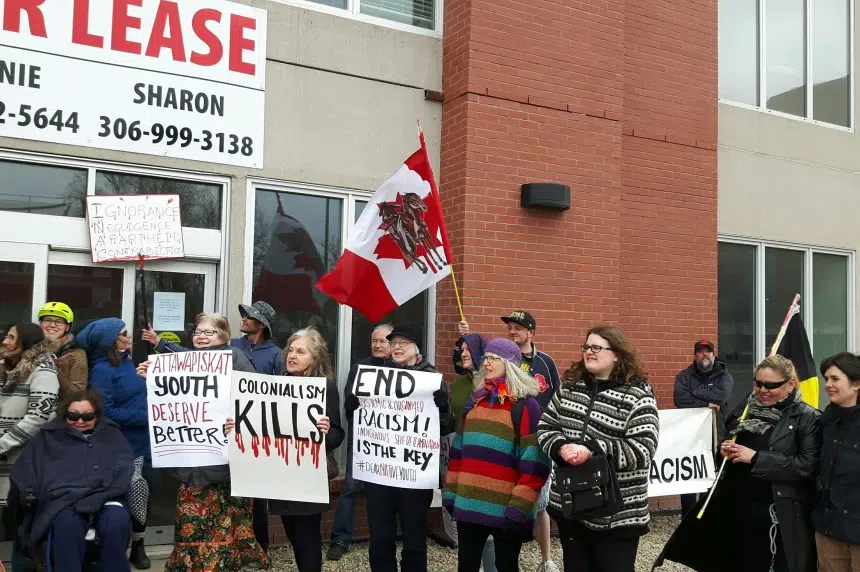There was a rally call for change Friday at noon outside the office of Aboriginal Affairs and Northern Development on Albert Street in downtown Regina.
A few dozen protestors came out to show solidarity with people who are staging sit-ins at the offices in Toronto and Winnipeg to demand action to address the suicide crisis in Attawapiskat and other northern reserves.
When protestors arrived in Regina, they found a typed sign on the door explaining that the office would be closed for the day. Some people at the rally pointed to that as a typical attitude from the government department, saying that they weren’t willing to listen.
“We see so many communities in crisis in Saskatchewan, in Ontario, across Canada, and it has started to get to the point where people don’t even really care,” said Robin Pitawanakwat who helped organize the rally in Regina.
She pointed out that there are many more First Nations communities that need help to provide better services.
“A month ago today, Keeseekoose and Cote First Nations declared mental health emergencies and nobody really took notice. It’s an old story and it’s a tired story, but nobody is more tired than the people in these communities.”
Pitawanakwat maintains that First Nations communities need funding to provide basic needs like clean water and education and address widespread issues of overcrowding and inadequate housing. But she argues for major change in the way that money is handed out by Indian and Northern Affairs.
“They are a heavily funded branch of the government. They have a lot of money, there is no reason why the people on these reserves don’t get that money directly,” Pitawanakwat argued. “The idea that we cannot administrate our own communities and our own funds is ridiculous. That there are people who have never been to these communities deciding who gets the money and what – is ridiculous.”
Many people at the rally expressed slightly different messages and opinions about what it would take to see real change for First Nations people. But most agreed that the widespread problems Aboriginal people are facing are rooted in the history colonialism.
“This colonization, this colonialism from the Indian Act has created poverty, it has created despair, it has created suicide,” said Sue Deranger who explained her name means to disturb, and she plans to disturb until her last dying breath.
She said it has paved the way for missing and murdered indigenous women and girls to disappear along with men and boys.
“It has to stop. We must have justice. The suicide has to end,” Deranger said, amid chants and cheers from a line of people waving signs on Albert Street.
Deranger argues that the Indian Act itself is the problem because it has dictated how indigenous people live for 140 years. She said when people begin to live in true equality then the other issues will be solved.
Wendy Lynn-Lerat said she believes society is beginning to wake up and move beyond colonization so they can connect some dots to the root of the problem. She said the crises in so many communities that are suffering from many different social issues are a symptom of that history.
Lynn-Lerat read from a declaration statement from the group involved with ‘Occupy INAC’ in Winnipeg. She agrees with their wording.
“It’s time for the indigenous voice to be heard,” she said.
Lynn-Lerat believes the key to true reconciliation and dealing with so many of these issues is to honour the treaties in their true form – a land sharing arrangement, not a release and surrender.











